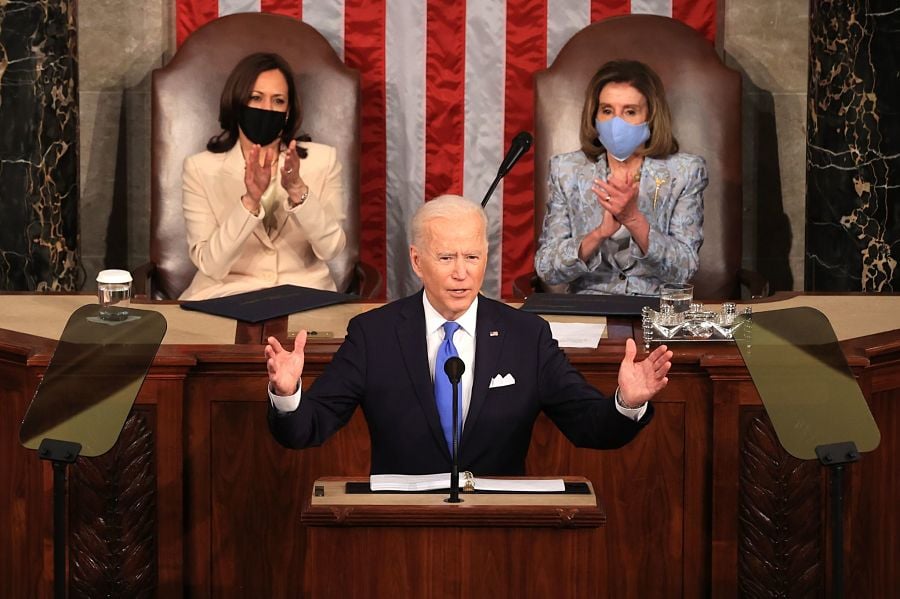

President Joe Biden declared that the U.S. has turned the corner on a pandemic that’s killed more than half a million Americans and crippled the economy, and he promised tax increases on the wealthy to pay for ambitious plans to spend trillions on infrastructure, education and other Democratic priorities.
“America is on the move again,” Biden said in his first address to a joint session of Congress on Wednesday. “Turning peril into possibility. Crisis into opportunity. Setback into strength.”
But he warned corporations and wealthy Americans that he expects them to carry more of the burden of financing the nation’s advancements.
“It’s time for corporate America and the wealthiest 1% of Americans to pay their fair share,” he said, promising to “reward work, not wealth” by raising taxes for the richest 1% and ordering an Internal Revenue Service “crackdown on millionaires and billionaires who cheat on their taxes.”
He would restore the top personal income tax rate to 39.6% for people earning more than $400,000 a year, tax capital gains at the same rate for people earning $1 million or more, and end a capital gains tax break on inheritances as well as the “carried interest” tax break utilized by fund managers.
“What I’ve proposed is fair. It’s fiscally responsible,” Biden said, promising programs financed in part by the tax increases would “create millions of jobs and grow the economy.”
Biden’s 65-minute speech laid out a broad vision for the country’s recovery from the pandemic, centered around a vastly expanded role for the federal government. His aides say he regards the nation’s emergence from a year of lockdowns, death and economic collapse as a unique opportunity to persuade voters that the country is more united -- and poised for massive taxpayer investments.
In the speech, the president unveiled his American Families Plan, a $1.8 trillion package of tax credits and domestic priorities including child care, paid family leave and tuition-free community college that would be funded in part by the largest tax increases on wealthy Americans in decades.
He also touted his previously proposed $2 trillion infrastructure bill, casting it as a jobs-maker especially for people without college degrees -- Americans who largely supported his predecessor, former President Donald Trump.
“Nearly 90% of the infrastructure jobs created in the American Jobs Plan don’t require a college degree,” he said. “Seventy-five percent do not require an associate’s degree.”
The plan, he said, is “a blue-collar blueprint to build America.”
“Good guys and women on Wall Street but Wall Street didn’t build this country,” he said. “The middle class built the country. And unions built the middle class.”
The two proposals follow the American Rescue Plan, a $1.9 trillion stimulus that Biden called “one of the most consequential rescue packages in American history.” Biden’s address also celebrated a coronavirus vaccine rollout that’s delivered more than 315 million shots and a stimulus program that provided more than 160 million checks to taxpayers.
“Our progress these past 100 days against one of the worst pandemics in history is one of the greatest logistical achievements our country has ever seen,” he said.
U.S. equity futures extended their gains as Biden spoke, building on an advance propelled by strong tech earnings. The Bloomberg Dollar Spot Index extended its post-Fed decline, dropping 0.1% as of 10:10 p.m. in New York. Treasury 10-year futures were little changed.
On foreign policy, Biden vowed to stand against Russia and China where he sees America’s interests at risk -- such as in the South China Sea -- but he also reiterated his willingness to work with rival nations on areas such as climate change.
“In my discussion with President Xi, I told him that we welcome the competition — and that we are not looking for conflict,” Biden said of Chinese leader Xi Jinping. “But I made absolutely clear that I will defend American interests across the board.”
Biden looked to frame both his accomplishments and aspirations as an implicit rebuttal of the disarray that defined the federal government during the Trump administration, eroding confidence in the nation’s ability to meet big challenges.

While industry statistics pointing to a succession crisis can cause alarm, advisor-owners should be free to consider a middle path between staying solo and catching the surging wave of M&A.

New joint research by T. Rowe Price, MIT, and Stanford University finds more diverse asset allocations among older participants.

With its asset pipeline bursting past $13 billion, Farther is looking to build more momentum with three new managing directors.

A Department of Labor proposal to scrap a regulatory provision under ERISA could create uncertainty for fiduciaries, the trade association argues.

"We continue to feel confident about our ability to capture 90%," LPL CEO Rich Steinmeier told analysts during the firm's 2nd quarter earnings call.
Orion's Tom Wilson on delivering coordinated, high-touch service in a world where returns alone no longer set you apart.
Barely a decade old, registered index-linked annuities have quickly surged in popularity, thanks to their unique blend of protection and growth potential—an appealing option for investors looking to chart a steadier course through today's choppy market waters, says Myles Lambert, Brighthouse Financial.
